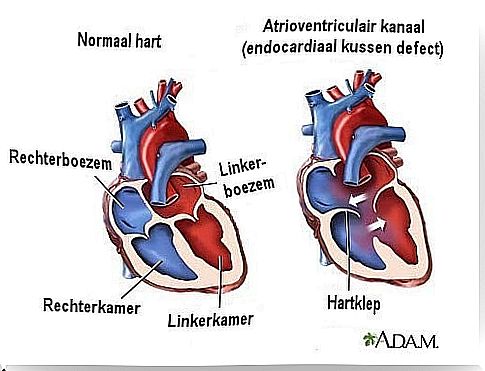7 Heart Murmur Symptoms You Should Know

There are many people who suffer from a heart murmur. While it’s true that a heart murmur is generally harmless, it still doesn’t hurt to know a little more about it.
A heart murmur occurs when the blood flows unevenly. This creates a strange sound, or noise, as blood flows through the blood vessels and heart valves.
Heart murmurs are classified into several degrees, depending on the pitch and strength of the sound. Most of these grades are, as we mentioned earlier, harmless.
However, in some cases, a heart murmur can indicate a more serious heart defect. That is why it is important to be aware of a heart murmur and to know what symptoms it is associated with.
We invite you to take in all the necessary information in this article. So pay attention!
1. How does a heart murmur develop?

- A particular problem with a heart valve: Heart murmurs can be caused by a thickened valve leaflet. This is usually a congenital defect that may require some care in the long term. Sometimes diseases such as atherosclerosis can also cause a valve leaflet to thicken. It is therefore important to have the right health care and regular check-ups with the cardiologist.
- Anemia: Did you know that anemia can cause a heart murmur? This is because there are too few red blood cells in the blood in anemia. This lowers the oxygen content. The heart then has to pump faster and this can lead to a heart murmur. So make sure you get enough iron!
- A problem between the heart’s chambers: This generally involves communication between the two atria (or atria) or the two ventricles of the heart. This condition is usually congenital.
- Atherosclerosis: We need to pay attention to this condition because it affects both the arteries and the heart. The damage is caused by the narrowing of the arteries, causing an abnormal rhythm in the bloodstream and producing a certain sound in the arteries (heart murmur).
- Other related ailments: Sometimes a fever or a thyroid problem can also cause a heart murmur. So we must not forget this.
2. Symptoms of a heart murmur

We often associate fatigue with the symptoms of a heart murmur. Heart problems are common in women. Usually not much attention is paid to this.
Factors such as stress, worry or the normal daily exhaustion make us not attach much importance to the issues we consider ‘normal’. But actually they might not be that normal at all.
It is important to learn to listen carefully to your body. Respond to what it is trying to tell you and don’t neglect any aspect related to your health. Pay close attention to the following warning signs.
Warning signs
- Your heart immediately starts pumping faster after a little light exertion. For example, when you climb a ladder or go up the stairs, run a short distance to catch the bus or when you continuously run back and forth in the morning to be ready in time, you immediately feel tired and your heart rate goes up. upwards. This is the most characteristic.
- You have trouble breathing. For example, when you have to pause immediately after a short walk, because you notice that you are short of breath.
- You experience pain in your chest every time you exert light effort. It’s like having a red-hot plate pressed against this part of your body.
- In more severe cases, it is common for the lips and fingertips to take on a blue glow after taking the stairs or taking a short walk. This is a symptom that occurs when there is a severe lack of oxygen in the blood. This condition is also known as cyanosis or cyanosis. If you notice this is the case with you, see your doctor right away.
- You suffer from swelling and constant fluid retention.
- After a little bit of movement, the veins in your neck swell considerably.
Be vigilant, even with the smallest symptoms. If you notice that your children are not developing well for their age and they are often very tired, let their doctor know.
3. Can you prevent a heart murmur?

Remember that heart murmurs are often caused by congenital problems. It is therefore wise to always follow the guidelines and recommendations that you have received from your doctor in these cases .
Maintaining a good quality of life and healthy habits can always help prevent heart problems. Therefore, do not hesitate to also take in and observe the guidelines below.
Some guidelines to follow
- Keep an eye on your cholesterol levels. This way you can prevent veins and arteries from hardening and you can ensure that you have a healthy circulation.
- Make sure to provide your body with a healthy amount of iron to prevent anemia. Never overlook foods rich in iron and vitamin C, as they can help prevent anemia.
- Maintain a balanced and varied diet. Limit your intake of fat and consume as little industrially processed foods, refined flour and salt as possible.
- There are different types of teas and infusions that are good for your heart health. Think horsetail, lemon balm, valerian root and hawthorn or an infusion of rosemary or rue. Even green tea infusions are good. Give them a try, you will love them!
- Some light exercise every day. If you don’t suffer from serious heart problems, never underestimate the importance of some light exercise to keep the heart rate active. Just a twenty minute walk or a little swim is enough.
- Finally, and perhaps most importantly, schedule periodic checkups with the cardiologist so that no problem goes unnoticed. Your health is worth it.









